- Home
- George Orwell
Orwell in Spain Page 23
Orwell in Spain Read online
Page 23
‘And you say you were with him at the front. Then you were serving in the POUM militia yourself?’
‘Yes.’
He turned and dived into the colonel’s room. I could hear an agitated conversation. ‘It’s all up,’ I thought. We should never get Kopp’s letter back. Moreover I had had to confess that I was in the POUM myself, and no doubt they would ring up the police and get me arrested, just to add another Trotskyist to the bag. Presently, however, the officer reappeared, fitting on his cap, and sternly signed to me to follow. We were going to the Chief of Police’s office. It was a long way, twenty minutes’ walk. The little officer marched stiffly in front with a military step. We did not exchange a single word the whole way. When we got to the Chief of Police’s office a crowd of the most dreadful-looking scoundrels, obviously police narks, informers, and spies of every kind, were hanging about outside the door. The little officer went in; there was a long, heated conversation. You could hear voices furiously raised; you pictured violent gestures, shruggings of the shoulders, bangings on the table. Evidently the police were refusing to give the letter up. At last, however, the officer emerged, flushed, but carrying a large official envelope. It was Kopp’s letter. We had won a tiny victory – which, as it turned out, made not the slightest difference. The letter was duly delivered, but Kopp’s military superiors were quite unable to get him out of jail.
The officer promised me that the letter should be delivered. But what about Kopp? I said. Could we not get him released? He shrugged his shoulders. That was another matter. They did not know what Kopp had been arrested for. He could only tell me that the proper inquiries would be made. There was no more to be said; it was time to part. Both of us bowed slightly. And then there happened a strange and moving thing. The little officer hesitated a moment, then stepped across and shook hands with me.
I do not know if I can bring home to you how deeply that action touched me. It sounds a small thing, but it was not. You have got to realise what was the feeling of the time – the horrible atmosphere of suspicion and hatred, the lies and rumours circulating everywhere, the posters screaming from the hoardings that I and everyone like me was a Fascist spy. And you have got to remember that we were standing outside the Chief of Police’s office, in front of that filthy gang of tale-bearers and agents provocateurs, any one of whom might know that I was ‘wanted’ by the police. It was like publicly shaking hands with a German during the Great War. I suppose he had decided in some way that I was not really a Fascist spy; still, it was good of him to shake hands.
I record this, trivial though it may sound, because it is somehow typical of Spain – of the flashes of magnanimity that you get from Spaniards in the worst of circumstances. I have the most evil memories of Spain, but I have very few bad memories of Spaniards. I only twice remember even being seriously angry with a Spaniard, and on each occasion, when I look back, I believe I was in the wrong myself. They have, there is no doubt, a generosity, a species of nobility, that do not really belong to the twentieth century. It is this that makes one hope that in Spain even Fascism may take a comparatively loose and bearable form. Few Spaniards possess the damnable efficiency and consistency that a modern totalitarian state needs. There had been a queer little illustration of this fact a few nights earlier, when the police had searched my wife’s room. As a matter of fact that search was a very interesting business, and I wish I had seen it, though perhaps it is as well that I did not, for I might not have kept my temper.
The police conducted the search in the recognised Ogpu or Gestapo style. In the small hours of the morning there was a pounding on the door, and six men marched in, switched on the light and immediately took up various positions about the room, obviously agreed upon beforehand. They then searched both rooms (there was a bathroom attached) with inconceivable thoroughness. They sounded the walls, took up the mats, examined the floor, felt the curtains, probed under the bath and the radiator, emptied every drawer and suitcase and felt every garment and held it up to the light. They impounded all papers, including the contents of the waste-paper basket, and all our books into the bargain. They were thrown into ecstasies of suspicion by finding that we possessed a French translation of Hitler’s Mein Kampf. If that had been the only book they found our doom would have been sealed. It is obvious that a person who reads Mein Kampf must be a Fascist. The next moment, however, they came upon a copy of Stalin’s pamphlet, Ways of Liquidating Trotskyists and other Double Dealers, which reassured them somewhat. In one drawer there was a number of packets of cigarette papers. They picked each packet to pieces and examined each paper separately, in case there should be messages written on them. Altogether they were on the job for nearly two hours. Yet all this time they never searched the bed. My wife was lying in bed all the while; obviously there might have been half a dozen sub-machine-guns under the mattress, not to mention a library of Trotskyist documents under the pillow. Yet the detectives made no move to touch the bed, never even looked underneath it. I cannot believe that this is a regular feature of the Ogpu routine. One must remember that the police were almost entirely under Communist control, and these men were probably Communist Party members themselves. But they were also Spaniards, and to turn a woman out of bed was a little too much for them. This part of the job was silently dropped, making the whole search meaningless.
That night McNair, Cottman, and I slept in some long grass at the edge of a derelict building-lot. It was a cold night for the time of year and no one slept much. I remember the long dismal hours of loitering about before one could get a cup of coffee. For the first time since I had been in Barcelona I went to have a look at the cathedral – a modern cathedral, and one of the most hideous buildings in the world. It had four crenellated spires exactly the shape of hock bottles. Unlike most of the churches in Barcelona it was not damaged during the revolution – it was spared because of its ‘artistic value’, people said. I think the Anarchists showed bad taste in not blowing it up when they had the chance, though they did hang a red and black banner between its spires. That afternoon my wife and I went to see Kopp for the last time. There was nothing that we could do for him, absolutely nothing, except to say good-bye and leave money with Spanish friends who would take him food and cigarettes. A little while later, however, after we had left Barcelona, he was placed incommunicado and not even food could be sent to him. That night, walking down the Ramblas, we passed the Café Moka, which the Assault Guards were still holding in force. On an impulse I went in and spoke to two of them who were leaning against the counter with their rifles slung over their shoulders. I asked them if they knew which of their comrades had been on duty here at the time of the May fighting. They did not know, and, with the usual Spanish vagueness, did not know how one could find out. I said that my friend Jorge Kopp was in prison and would perhaps be put on trial for something in connection with the May fighting; that the men who were on duty here would know that he had stopped the fighting and saved some of their lives; they ought to come forward and give evidence to that effect. One of the men I was talking to was a dull, heavy-looking man who kept shaking his head because he could not hear my voice in the din of the traffic. But the other was different. He said he had heard of Kopp’s action from some of his comrades; Kopp was buen chico (a good fellow). But even at the time I knew that it was all useless. If Kopp were ever tried, it would be, as in all such trials, with faked evidence. If he has been shot (and I am afraid it is quite likely), that will be his epitaph: the buen chico of the poor Assault Guard who was part of a dirty system but had remained enough of a human being to know a decent action when he saw one.
It was an extraordinary, insane existence that we were leading. By night we were criminals, but by day we were prosperous English visitors – that was our pose, anyway. Even after a night in the open, a shave, a bath and a shoe-shine do wonders with your appearance. The safest thing at present was to look as bourgeois as possible. We frequented the fashionable residential quarter of the town, where our faces
were not known, went to expensive restaurants and were very English with the waiters. For the first time in my life I took to writing things on walls. The passageways of several smart restaurants had ‘Visca POUM!’ scrawled on them as large as I could write it. All the while, though I was technically in hiding, I could not feel myself in danger. The whole thing seemed too absurd. I had the ineradicable English belief that ‘they’ cannot arrest you unless you have broken the law. It is a most dangerous belief to have during a political pogrom. There was a warrant out for McNair’s arrest, and the chances were that the rest of us were on the list as well. The arrests, raids, searchings were continuing without pause; practically everyone we knew, except those who were still at the front, was in jail by this time. The police were even boarding the French ships that periodically took off refugees and seizing suspected ‘Trotskyists’.
Thanks to the kindness of the British Consul, who must have had a very trying time during that week, we had managed to get our passports into order. The sooner we left the better. There was a train that was due to leave for Port Bou at half-past seven in the evening and might normally be expected to leave at about half-past eight. We arranged that my wife should order a taxi beforehand and then pack her bags, pay her bill and leave the hotel at the last possible moment. If she gave the hotel-people too much notice they would be sure to send for the police. I got down to the station at about seven to find that the train had already gone – it had left at ten to seven. The engine-driver had changed his mind, as usual. Fortunately we managed to warn my wife in time. There was another train early the following morning. McNair, Cottman, and I had dinner at a little restaurant near the station and by cautious questioning discovered that the restaurant-keeper was a CNT member and friendly. He let us a three-bedded room and forgot to warn the police. It was the first time in five nights that I had been able to sleep with my clothes off.
Next morning my wife slipped out of the hotel successfully. The train was about an hour late in starting. I filled in the time by writing a long letter to the Ministry of War, telling them about Kopp’s case – that without a doubt he had been arrested by mistake, that he was urgently needed at the front, that countless people would testify that he was innocent of any offence, etc. etc. etc. I wonder if anyone read that letter, written on pages torn out of a note-book in wobbly handwriting (my fingers were still partly paralysed) and still more wobbly Spanish. At any rate, neither this letter nor anything else took effect. As I write, six months after the event, Kopp (if he has not been shot) is still in jail, untried and uncharged. At the beginning we had two or three letters from him, smuggled out by released prisoners and posted in France. They all told the same story – imprisonment in filthy dark dens, bad and insufficient food, serious illness due to the conditions of imprisonment, and refusal of medical attention. I have had all this confirmed from several other sources, English and French. More recently he disappeared into one of the ‘secret prisons’ with which it seems impossible to make any kind of communication. His case is the case of scores or hundreds of foreigners and no one knows how many thousands of Spaniards.
In the end we crossed the frontier without incident. The train had a first class and a dining-car, the first I had seen in Spain. Until recently there had been only one class on the trains in Catalonia. Two detectives came round the train taking the names of foreigners, but when they saw us in the dining-car they seemed satisfied that we were respectable. It was queer how everything had changed. Only six months ago, when the Anarchists still reigned, it was looking like a proletarian that made you respectable. On the way down from Perpignan to Cerbères a French commercial traveller in my carriage had said to me in all solemnity: ‘You mustn’t go into Spain looking like that. Take off that collar and tie. They’ll tear them off you in Barcelona.’ He was exaggerating, but it showed how Catalonia was regarded. And at the frontier the Anarchist guards had turned back a smartly-dressed Frenchman and his wife, solely – I think – because they looked too bourgeois. Now it was the other way about; to look bourgeois was the one salvation. At the passport office they looked us up in the card-index of suspects, but thanks to the inefficiency of the police our names were not listed, not even McNair’s. We were searched from head to foot, but we possessed nothing incriminating, except my discharge-papers, and the carabineros who searched me did not know that the 29th Division was the POUM. So we slipped through the barrier, and after just six months I was on French soil again. My only souvenirs of Spain were a goatskin waterbottle and one of those tiny iron lamps in which the Aragón peasants burn olive-oil – lamps almost exactly the shape of the terra-cotta lamps that the Romans used two thousand years ago – which I had picked up in some ruined hut, and which had somehow got stuck in my luggage.
After all, it turned out that we had come away none too soon. The very first newspaper we saw announced McNair’s arrest for espionage. The Spanish authorities had been a little premature in announcing this. Fortunately, ‘Trotskyism’ is not extraditable.
I wonder what is the appropriate first action when you come from a country at war and set foot on peaceful soil. Mine was to rush to the tobacco-kiosk and buy as many cigars and cigarettes as I could stuff into my pockets. Then we all went to the buffet and had a cup of tea, the first tea with fresh milk in it that we had had for many months. It was several days before I could get used to the idea that you could buy cigarettes whenever you wanted them. I always half-expected to see the tobacconists’ doors barred and the forbidding notice ‘No hay tabaco’ in the window.
McNair and Cottman were going on to Paris. My wife and I got off the train at Banyuls, the first station up the line, feeling that we would like a rest. We were not too well received in Banyuls when they discovered that we had come from Barcelona. Quite a number of times I was involved in the same conversation: ‘You come from Spain? Which side were you fighting on? The Government? Oh!’ – and then a marked coolness. The little town seemed solidly pro-Franco, no doubt because of the various Spanish Fascist refugees who had arrived there from time to time. The waiter at the cafá I frequented was a pro-Franco Spaniard and used to give me lowering glances as he served me with an aperitif. It was otherwise in Perpignan, which was stiff with Government partisans and where all the different factions were caballing against one another almost as in Barcelona. There was one café where the word ‘POUM’ immediately procured you French friends and smiles from the waiter.
I think we stayed three days in Banyuls. It was a strangely restless time. In this quiet fishing-town, remote from bombs, machine-guns, food-queues, propaganda, and intrigue, we ought to have felt profoundly relieved and thankful. We felt nothing of the kind. The things we had seen in Spain did not recede and fall into proportion now that we were away from them; instead they rushed back upon us and were far more vivid than before. We thought, talked, dreamed incessantly of Spain. For months past we had been telling ourselves that ‘when we get out of Spain’ we would go somewhere beside the Mediterranean and be quiet for a little while and perhaps do a little fishing; but now that we were here it was merely a bore and a disappointment. It was chilly weather, a persistent wind blew off the sea, the water was dull and choppy, round the harbour’s edge a scum of ashes, corks, and fish-guts bobbed against the stones. It sounds like lunacy, but the thing that both of us wanted was to be back in Spain. Though it could have done no good to anybody, might indeed have done serious harm, both of us wished that we had stayed to be imprisoned along with the others. I suppose I have failed to convey more than a little of what those months in Spain mean to me. I have recorded some of the outward events, but I cannot record the feeling they have left me with. It is all mixed up with sights, smells, and sounds that cannot be conveyed in writing: the smell of the trenches, the mountain dawns stretching away into inconceivable distances, the frosty crackle of bullets, the roar and glare of bombs; the clear cold light of the Barcelona mornings, and the stamp of boots in the barrack yard, back in December when people still believed in the re
volution; and the food-queues and the red and black flags and the faces of Spanish militiamen; above all the faces of militiamen – men whom I knew in the line and who are now scattered Lord knows where, some killed in battle, some maimed, some in prison – most of them, I hope, still safe and sound. Good luck to them all; I hope they win their war and drive all the foreigners out of Spain, Germans, Russians and Italians alike. This war, in which I played so ineffectual a part, has left me with memories that are mostly evil, and yet I do not wish that I had missed it. When you have had a glimpse of such a disaster as this – and however it ends the Spanish war will turn out to have been an appalling disaster, quite apart from the slaughter and physical suffering – the result is not necessarily disillusionment and cynicism. Curiously enough the whole experience has left me with not less but more belief in the decency of human beings. And I hope the account I have given is not too misleading. I believe that on such an issue as this no one is or can be completely truthful. It is difficult to be certain about anything except what you have seen with your own eyes, and consciously or unconsciously everyone writes as a partisan. In case I have not said this somewhere earlier in the book I will say it now: beware of my partisanship, my mistakes of fact and the distortion inevitably caused by my having seen only one corner of events. And beware of exactly the same things when you read any other book on this period of the Spanish war.
Because of the feeling that we ought to be doing something, though actually there was nothing we could do, we left Banyuls earlier than we had intended. With every mile that you went northward France grew greener and softer. Away from the mountain and the vine, back to the meadow and the elm. When I had passed through Paris on my way to Spain it had seemed to be decayed and gloomy, very different from the Paris I had known eight years earlier, when living was cheap and Hitler was not heard of. Half the cafés I used to know were shut for lack of custom, and everyone was obsessed with the high cost of living and the fear of war. Now, after poor Spain, even Paris seemed gay and prosperous. And the Exhibition was in full swing, though we managed to avoid visiting it.

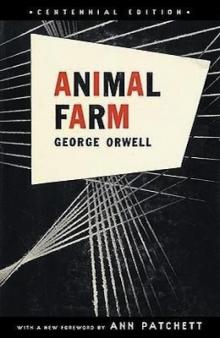 Animal Farm & 1984
Animal Farm & 1984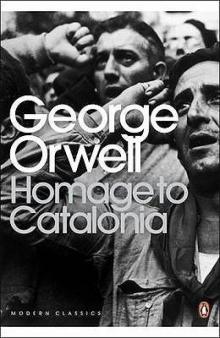 Homage to Catalonia
Homage to Catalonia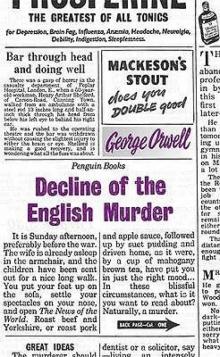 Decline of the English Murder
Decline of the English Murder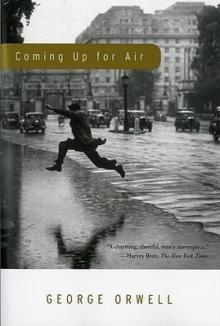 Coming Up for Air
Coming Up for Air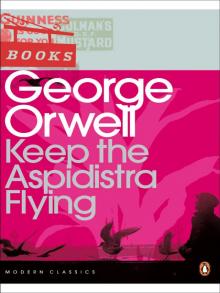 Keep the Aspidistra Flying
Keep the Aspidistra Flying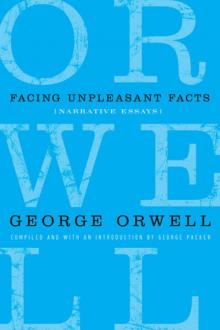 Facing Unpleasant Facts: Narrative Essays
Facing Unpleasant Facts: Narrative Essays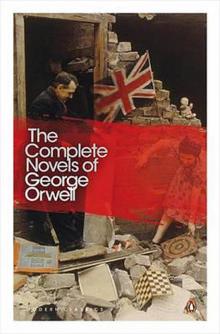 The Complete Novels of George Orwell
The Complete Novels of George Orwell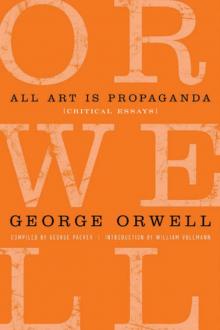 All Art Is Propaganda: Critical Essays
All Art Is Propaganda: Critical Essays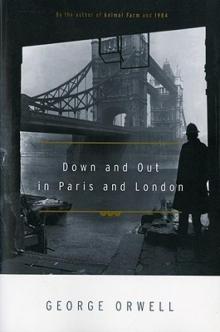 Down and Out in Paris and London
Down and Out in Paris and London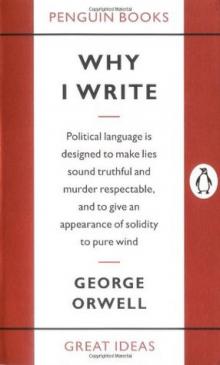 Why I Write
Why I Write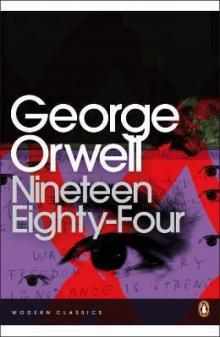 Nineteen Eighty-Four
Nineteen Eighty-Four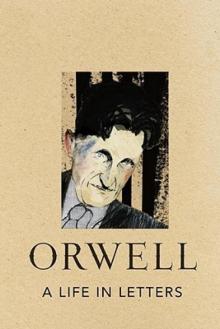 A Life in Letters
A Life in Letters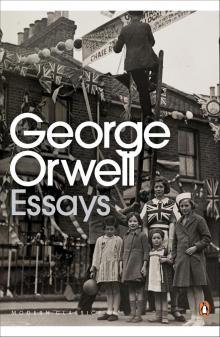 Essays
Essays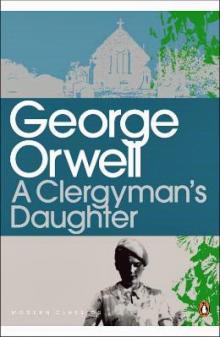 A Clergyman's Daughter
A Clergyman's Daughter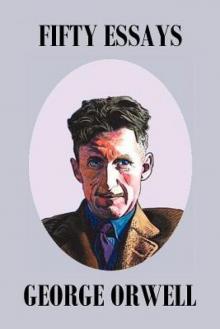 Fifty Orwell Essays
Fifty Orwell Essays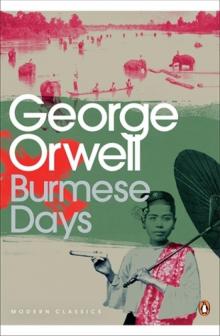 Burmese Days
Burmese Days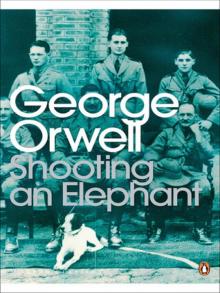 Shooting an Elephant
Shooting an Elephant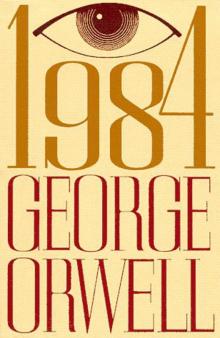 1984 (Penguin)
1984 (Penguin)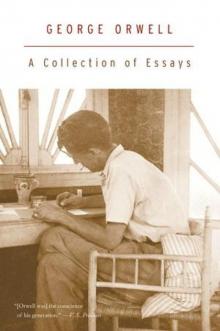 A Collection of Essays
A Collection of Essays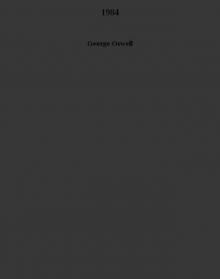 1984
1984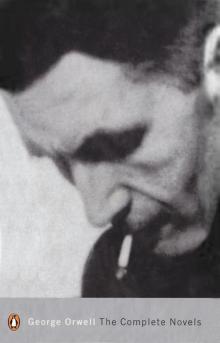 The Complete Novels
The Complete Novels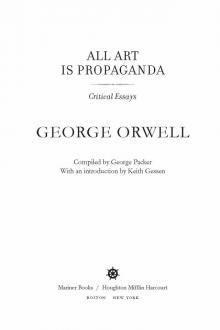 All Art Is Propaganda
All Art Is Propaganda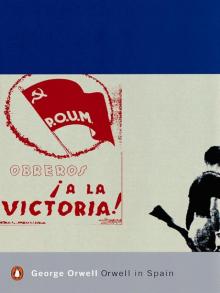 Orwell in Spain
Orwell in Spain Animal Farm: A Fairy Story
Animal Farm: A Fairy Story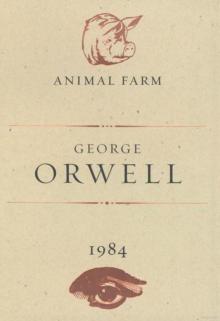 Animal Farm and 1984
Animal Farm and 1984